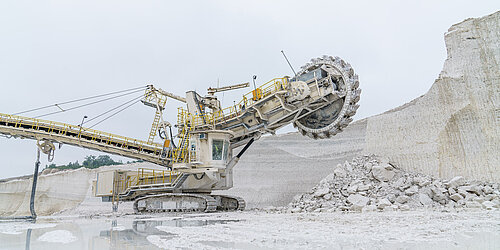Per Brevik is responsible for alternative fuels, climate and sustainability at Heidelberg Materials Northern Europe. In the current implementation phase of the Brevik CCS project, he is responsible for lead interactions with authorities, permit applications, and public affairs. Heidelberg Materials is realising the world's first industrial-scale CCS (Carbon Capture and Storage) system at a cement plant in Brevik.

Copyright: Heidelberg Materials Northern Europe
Low carbon/sustainable cement and concrete have been in focus in Norway for many years, and the interest has increased further with the Brevik-project.
What success factors do you see in the implementation of the Brevik CCS project in Norway? What role does social acceptance play in this?
Brevik CCS will be the first full-scale carbon capture project in the cement industry. To succeed I think the following elements have been the most important:
- Long term testing of the technology at the plant to build confidence in the technology, especially since this is the first project. Maturing the project has grown confidence.
- Good planning. It is a brown field project; rebulding of a plant in operation. This will be the situation for many industries and plants. To understand how to install a solution, whilst maintaining production will be a challenge for most plants who plan to install carbon capture facilities. Downtime is expensive.
- In addition it is critical to secure good communication and balance between the cement plant operations and the project. Responsibilities and decision control must be defined.
- Establish a good project team with a broad competence and experience. Good communication routines a must!
The plant has a long-term relation with the neighbours; with regular meetings 2-4 times per year with the local neighbourhood-NGO. Through these meetings we keep them informed about ongoing projects, plant development and planned improvements/changes. It’s important to give the information early and directly from the plant, and they have the opportunities to ask questions and discus possible solutions.
Are employees motivated to help shape the innovation projects? What helps to motivate the employees?
Yes, and they have always been. We always try to involve the employees as early as possible in all improvement projects. Since the beginning of the 90’s, the plant has executed a huge number of projects connected with testing of alternative fuels and raw materials before the CCS-project was launched ten years ago and approved in Parliament in 2020. The employees are always part of the project organisation. They see that the plant „walks the talk“ when it comes to environmental focus, and this spurs optimism and dedication.
Communication, and especially internal information, is a must! In addition, we are all proud to be part of the first CCS-project in the cement industry world wide. Everybody wants to contribute to reduce emissions.
What is the acceptance of sustainable cement and concrete products in Norway? Are customers, including construction companies, willing to purchase these products and build with them? Where are the price differences?
Low carbon/sustainable cement and concrete have been in focus in Norway for many years, and the interest has increased further with the Brevik-project. The project developers and the building industry follows the project closely and are loooking forward to see the product with an extremely low carbon footprint on the market. We experience a willingness to purchase the products already before the project is delivered!
The first price discussions are taking place in these days with focus on our increased production costs (our part of CAPEX and OPEX) and the availability of CCS-cement in the market. In addition; until more projects are realised, logistics and distribution will be a key.
About
Per Brevik
Responsible for Permits and Governmental Affairs, Heidelberg Materials Northern Europe
Per Brevik earned his Master of Science degree from NHH Norwegian School of Economics in 1979. He became a part of the Aker Norcem Group in 1989, where he has played a pivotal role in the company's journey. Since 1993, he has held the position of being responsible for Alternative fuels, climate, and sustainability at Heidelberg Materials AG. Notably, he took charge of the Brevik CCS project, successfully guiding it through the approval process in Parliament in December 2020. In the execution phase, he continues to contribute significantly, overseeing interactions with authorities, handling permit applications, and managing public affairs.
Über die Interviewreihe
In der Rubrik „Drei Fragen an...” kommen Fachleute aus den energieintensiven Industrien zu Wort. Sie geben Einblick in branchenspezifische Aspekte der Dekarbonisierung und sprechen über Strategien für eine klimaneutrale Industrie.
Alle Interviews
